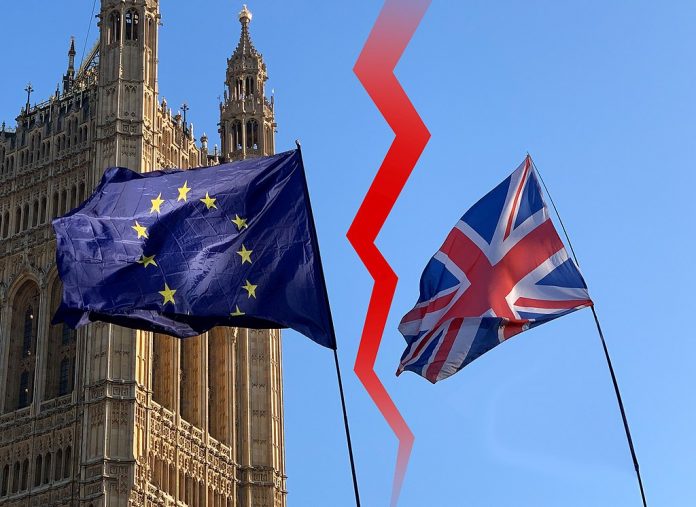With Brexit on hold and a new General Election kicking off, now is a good time to take stock of the political situation in the UK. We have complied a few questions and answers below. If any readers want to suggest some further questions about Brexit, the election and what it means for British and European politics please get in touch via Twitter.
Is Brexit going ahead and is there a new deal?
In theory. The recently elected Conservative Prime Minister Boris Johnson brought a new deal back from Brussels, united his party and attempted to get it through parliament, but ran into a new set of obstacles along the way.
How is the new deal different?
The new deal involves mostly cosmetic changes to May’s Withdrawal Agreement, but these, along with time pressure and his new leadership style, were enough to win over the right-wing of his new party. The contentious Irish backstop was rebranded and tweaked, but the government´s Northern Irish allies in the DUP still withheld their support, meaning that even while winning the support of Eurosceptics within his own party the PM lost valuable allies elsewhere.
So why didn’t the new deal win support?
Technically the deal did win support in principle, with the House of Commons voting 329 to 299 on the second reading of the bill. This means that a majority of MPs voted to move forward with the deal, although they may have switched their vote or pushed for changes later in the process. Crucially, MPs rejected his proposed timetable for pushing the Withdrawal Agreement through by October 31st and looked set to amend the legislation the deal in various ways. So while Johnson won support on the principle of the deal, he lost control of the process.
Why is there an extension and election?
Johnson had promised big things to his political allies and to his electoral base, and by losing control of the process he lost the ability to deliver. In particular, he was not able to keep his promise to deliver Brexit by October 31st. So instead, he preferred to go into an election in which he could present himself as the true Brexiteer against the Remain-supporting political elites in Parliament. Despite the Conservatives having been in power for 9 years, Johnson and his political strategists hope to tap into popular dissatisfaction by running a “people vs Parliament” campaign. If he wins a solid majority this will give him a unified party, effective control of the legislative process and the space he needs to push through Brexit on his own terms.
What is the election supposed to achieve?
The Tories have pushed out many of the moderates in their own party, so whatever happens they go into this election with a more unified message on Brexit. If they can make their election campaign about delivering Brexit then they hope to win seats from the Labour Party. A majority of 30-40 seats would allow them to push through their version of Brexit and move on to their domestic agenda. While Brexit will be far from over, the Conservative government will have set it on a definitive path, delivered on what they see as the result of the referendum and will have room to develop their own, Johnsonian agenda.
Is no deal still possible?
Technically it is, but at this stage all the main parties have policies in place which make it unlikely. The Tories are running on their current deal, meaning they will have to implement it if they win. The European Union would certainly refuse to reopen negotiations any further if they stay in power. The Labour Party would attempt to renegotiate a softer Brexit, including a customs union and perhaps single market membership which the EU would most definitely accept, and would then present this to the public in a Deal versus Remain referendum. So while no deal remains a legal possibility, it is hard to see a pathway towards it happening.
Who is likely to win?
The Conservative Party have polling and leadership ratings on their side, with Labour’s Jeremy Corbyn being the most unpopular opposition leader in modern history. The Conservatives started the campaign with around a 10-point lead in polling averages and still maintain a similar advantage. However, they face a structural disadvantage because they are predicted to lose seats in Scotland and in remain supporting constituencies in the south of England, meaning that they have to win dozens of seats in Labour’s Northern heartlands. This complete redrawing of the electoral map worked with Nixon and the Southern Strategy, but it is extremely risky. Many traditional Labour voting seats in the North of England did vote to leave the EU, theoretically making this fertile ground for the Tories. However, ex-Labour voters may be more likely vote with the Brexit Party or simply stay at home, as the Conservative Party remain deeply distrusted in that part of the country. Even a collapse in support for Labour doesn’t guarantee Tory victories. The image of the Tories as out of touch, elite tribunes of capital has been compounded by a horrific and inept start to the campaign, with several of their prominent politicians appearing dismissive of the working-class victims of the Grenfell fire disaster.
While the Tories are pursuing a high-risk, high-reward strategy the Labour Party has more avenues towards forming a government. While polling and their weakness in Scotland suggests they will struggle to form a solid majority, they have more options for potential coalitions than the Tories. All Labour have to do is deny the Tories a majority, and they can look to gain support from the nationalists, Greens and potentially the Lib Dems, the two latter of whom have already formed a Remain electoral pact. The Tories have recently alienated their only allies in the DUP, meaning that anything other than a solid Tory majority leads to a de facto Labour victory, even if they do not themselves win a full majority.
That said, the Brexit Party has announced that they will not contest all 317 seats the Conservative Party won in the last election, an effective Leave alliance which will leave the Brexit vote unsplit in those seats. This will help the Tories to defend their seats from the Liberal Democrats and Labour but will not help them in the Tory-Labour marginals that they need to win in the north and Midlands of England.
Overall, the election result is hard to predict due to the voting system, the rise of new parties and poor polling. The last election also saw a Labour surge fairly late in the campaign, meaning that we should be very sceptical of early polling in particular. The Tories went into the last election with an even greater poll lead than they currently have, and still most seats. The fundamentals still point towards a Conservative government forming after the next election, but ultimately it is impossible to predict.
Image credit: Christoph Scholz [CC BY-SA 2.0], via Wikimedia Commons
The views and opinions expressed in this article are those of the author and do not necessarily reflect the official policy or position of The Geopolitics.
About the Authors

Daniel Odin Shaw is a Ph.D. candidate at the University of Glasgow, focusing primarily on non-state actors and conflict resolution as well as extremist political movements. He has been published in Ms. Magazine Online, The Monthly Review and Global Politics.co.uk. He tweets at @DanielOdinShaw.



